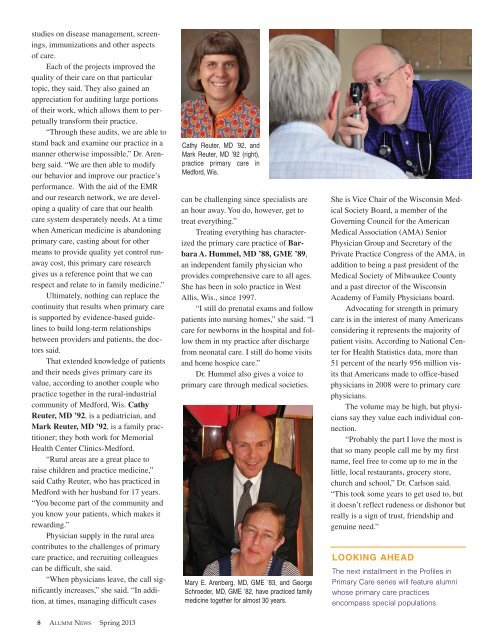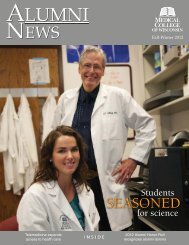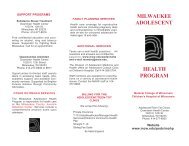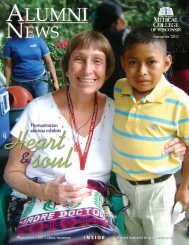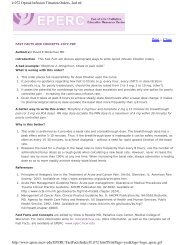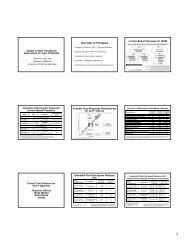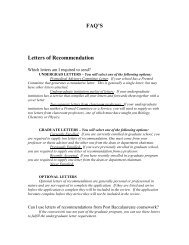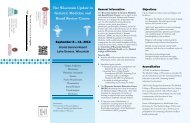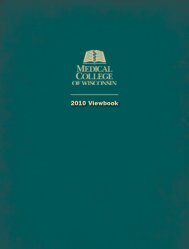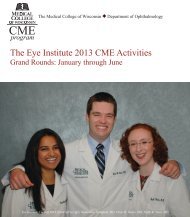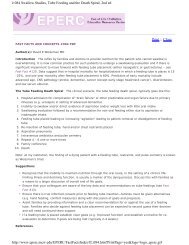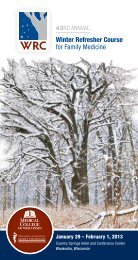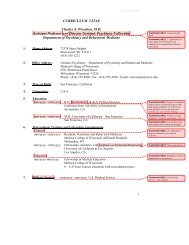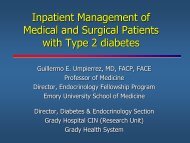Spring 2013 issue (pdf) - Medical College of Wisconsin
Spring 2013 issue (pdf) - Medical College of Wisconsin
Spring 2013 issue (pdf) - Medical College of Wisconsin
Create successful ePaper yourself
Turn your PDF publications into a flip-book with our unique Google optimized e-Paper software.
studies on disease management, screenings,<br />
immunizations and other aspects<br />
<strong>of</strong> care.<br />
Each <strong>of</strong> the projects improved the<br />
quality <strong>of</strong> their care on that particular<br />
topic, they said. They also gained an<br />
appreciation for auditing large portions<br />
<strong>of</strong> their work, which allows them to perpetually<br />
transform their practice.<br />
“Through these audits, we are able to<br />
stand back and examine our practice in a<br />
manner otherwise impossible,” Dr. Arenberg<br />
said. “We are then able to modify<br />
our behavior and improve our practice’s<br />
performance. With the aid <strong>of</strong> the EMR<br />
and our research network, we are developing<br />
a quality <strong>of</strong> care that our health<br />
care system desperately needs. At a time<br />
when American medicine is abandoning<br />
primary care, casting about for other<br />
means to provide quality yet control runaway<br />
cost, this primary care research<br />
gives us a reference point that we can<br />
respect and relate to in family medicine.”<br />
Ultimately, nothing can replace the<br />
continuity that results when primary care<br />
is supported by evidence-based guidelines<br />
to build long-term relationships<br />
between providers and patients, the doctors<br />
said.<br />
That extended knowledge <strong>of</strong> patients<br />
and their needs gives primary care its<br />
value, according to another couple who<br />
practice together in the rural-industrial<br />
community <strong>of</strong> Medford, Wis. Cathy<br />
Reuter, MD ’92, is a pediatrician, and<br />
Mark Reuter, MD ’92, is a family practitioner;<br />
they both work for Memorial<br />
Health Center Clinics-Medford.<br />
“Rural areas are a great place to<br />
raise children and practice medicine,”<br />
said Cathy Reuter, who has practiced in<br />
Medford with her husband for 17 years.<br />
“You become part <strong>of</strong> the community and<br />
you know your patients, which makes it<br />
rewarding.”<br />
Physician supply in the rural area<br />
contributes to the challenges <strong>of</strong> primary<br />
care practice, and recruiting colleagues<br />
can be difficult, she said.<br />
“When physicians leave, the call significantly<br />
increases,” she said. “In addition,<br />
at times, managing difficult cases<br />
Cathy Reuter, MD ’92, and<br />
Mark Reuter, MD ’92 (right),<br />
practice primary care in<br />
Medford, Wis.<br />
can be challenging since specialists are<br />
an hour away. You do, however, get to<br />
treat everything.”<br />
Treating everything has characterized<br />
the primary care practice <strong>of</strong> Barbara<br />
A. Hummel, MD ’88, GME ’89,<br />
an independent family physician who<br />
provides comprehensive care to all ages.<br />
She has been in solo practice in West<br />
Allis, Wis., since 1997.<br />
“I still do prenatal exams and follow<br />
patients into nursing homes,” she said. “I<br />
care for newborns in the hospital and follow<br />
them in my practice after discharge<br />
from neonatal care. I still do home visits<br />
and home hospice care.”<br />
Dr. Hummel also gives a voice to<br />
primary care through medical societies.<br />
Mary E. Arenberg, MD, GME ’83, and George<br />
Schroeder, MD, GME ’82, have practiced family<br />
medicine together for almost 30 years.<br />
She is Vice Chair <strong>of</strong> the <strong>Wisconsin</strong> <strong>Medical</strong><br />
Society Board, a member <strong>of</strong> the<br />
Governing Council for the American<br />
<strong>Medical</strong> Association (AMA) Senior<br />
Physician Group and Secretary <strong>of</strong> the<br />
Private Practice Congress <strong>of</strong> the AMA, in<br />
addition to being a past president <strong>of</strong> the<br />
<strong>Medical</strong> Society <strong>of</strong> Milwaukee County<br />
and a past director <strong>of</strong> the <strong>Wisconsin</strong><br />
Academy <strong>of</strong> Family Physicians board.<br />
Advocating for strength in primary<br />
care is in the interest <strong>of</strong> many Americans<br />
considering it represents the majority <strong>of</strong><br />
patient visits. According to National Center<br />
for Health Statistics data, more than<br />
51 percent <strong>of</strong> the nearly 956 million visits<br />
that Americans made to <strong>of</strong>fice-based<br />
physicians in 2008 were to primary care<br />
physicians.<br />
The volume may be high, but physicians<br />
say they value each individual connection.<br />
“Probably the part I love the most is<br />
that so many people call me by my first<br />
name, feel free to come up to me in the<br />
little, local restaurants, grocery store,<br />
church and school,” Dr. Carlson said.<br />
“This took some years to get used to, but<br />
it doesn’t reflect rudeness or dishonor but<br />
really is a sign <strong>of</strong> trust, friendship and<br />
genuine need.”<br />
LOOKING AHEAD<br />
The next installment in the Pr<strong>of</strong>iles in<br />
Primary Care series will feature alumni<br />
whose primary care practices<br />
encompass special populations.<br />
8 ALUMNI NEWS <strong>Spring</strong> <strong>2013</strong>


